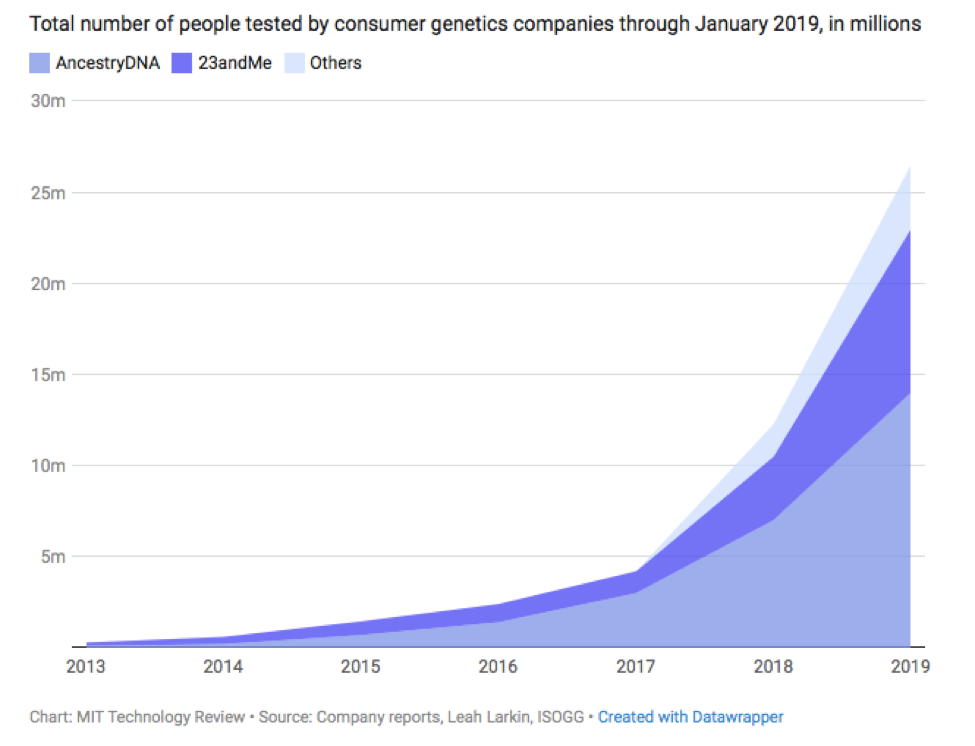by Jack Riegert, BGSU History major. This is one in a series of posts written by students in HIST 4800 in Spring, 2020, putting our world into historical context for the public.
While the thrill of local and world history can be one hell of a goose-chase, genealogy DNA test kits are growing to be a popular medium for people to pursue this. Genealogy isn’t just a study of the run of the mill tax records or census records; being in the 21stcentury DNA testing is a new way to try to get an accurate analysis of your family’s history! In the past five years, the growing industry of genealogy welcomed many new businesses and startups into the industry, businesses like 23andMe and Ancestry being the two largest. America is the melting pot, and most people have a general idea where their family comes from, sometimes indicated by last name, oral history, and skin color.
Per the MIT Technology Review, over 26 million Americans submitted their DNA to many genealogy companies to scope out their family history in 2019 (see Figure 1). Since this form of technology is a somewhat of a new phenomenon (the saliva testing, figure 2) there can be a large margin of error. Some errors can include: human testing error, skewed statistics as they can only compare saliva to a sample of what they already have. As far as numbers are concerned, 26 million test kits were sold, but the number of people that submitted is unknown. Regardless, the popularity still grows despite the validity of these tests. It is known, however, people sometimes buy a test kit from two different companies to bounce the results off one another, and then they begin to pray for accuracy.

https://www.technologyreview.com/2019/02/11/103446/more-than-26-million-people-have-taken-an-at-home-ancestry-test/
There are some skeptics to how true these results may be, especially when it comes to the celebrity family tree. According Psychology Today, researchers found a surprising star-studded list of who is related to who; wild examples include Barack Obama and Dick Cheney being related through a Huguenot who came to Maryland in 1650. While the certain Huguenot, whose name was not disclosed, took many wives and therefore had many children, other honorable mentions to his famous family tree include “President Truman, Robert Duvall, Warren Buffett”. Any of us now may wish to also be in this family tree now too!

https://www.technologyreview.com/2019/02/11/103446/more-than-26-million-people-have-taken-an-at-home-ancestry-test/
The problem is that if someone were to go back far enough, they would find that we all have some sort of common ancestor. Dr. Peter Ralph , a professor of computational biology, said,
The fact that everyone has two parents means that the number of ancestors for each individual doubles every generation. By using basic mathematics, we can calculate that ten generations ago each individual had a thousand ancestors, and 20 generations ago they had a million and so on. But when we get to 40 generations ago, in the time of Charlemagne, we arrive at a trillion ancestors and that is a problem because we now have more ancestors than there were people. Thus one can deduce that a lot of those ancestors must be the same person.
Also, how can anyone prove that a family tree is true? People lie all the time and people also try to cover things up that they don’t want known, especially in more conservative and restrictive times in the earlier years regarding legitimate children. Where do you draw the line? Well, people love stories, we are story tellers, especially us historians. So, Psychology Today believes that it’s the stories that we like to hear, not necessarily our genes that interest us. To any consolation, what does it matter anyway? We can try fact check it, but if the information was inaccurate when it was recorded, then you may not get very far.
Should you want to climb your family tree, you will either need the money or the time to do it and sometimes both. Ancestry.com can get pricey, and free websites can only get you so far; cases may vary. The saliva test isn’t always the best way to go either, especially if someone is descendent from slaves, as many families of slaves were separated or not properly recorded. So a genealogy search is very hit or miss and even then, can you believe what you’re reading or seeing? Are there facts to back up your claim? That is where the money comes in, to hire someone look for you, find the results, and make their conclusions about your family. It’s tough, but it takes one person to do it, and then the family’s history will last forever among your descendants, assuming they keep it up to date as well. However, many people also research their family’s past even just as a hobby.
